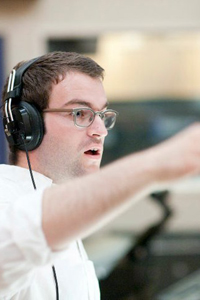"Arranging is the most fundamental, bread-and-butter skill you can invest in. I teach students the nuts and bolts they need to construct the music they hear in their imaginations. We commit so much energy to learning these skills so that we can translate our aesthetic vision from our inner hearing onto the page and into the world."
"I insist that my students strive for clarity and focus in their work, on both the macro and micro levels. Part of that process is ridding their work of superfluous information. Can we accomplish the same effect with less? How do you make it tight and uniquely yours? Often students have a lot of talent, but don’t have focused ideas. I want to help them focus."
"I constantly emphasize the importance of establishing a clear vision of the music and then wedding that vision to the techniques we are talking about in class. When you are learning how to arrange, it can feel very mechanical at times. I try to help my students understand arranging not as a set of rules to follow, but as a set of tools to help them further their aesthetic. How do we take this general information and turn it into something unique? My goal, more than anything, is to make the academic personal. Because these skills don’t mean anything until students use them in their own work."
"I make a living doing the things that I teach in class. I write arrangements of jazz and pop music for recordings, concerts, and television broadcasts. I speak passionately about the subject because it is not a theoretical exercise for me; I am living it. I try to make my classroom reflect my reality in the professional world. I assess my students given where they are in their education, but I also try to assess them as someone outside the Berklee community would. They’ll get two grades from me on their projects: the student grade and the grade they would get outside of Berklee. I like to think of myself as their client. From week to week I am commissioning them, and I expect them to wow me every time."

